Day of Mindful Recovery Aids Addiction Recovery
Written by: Debra Greenfield
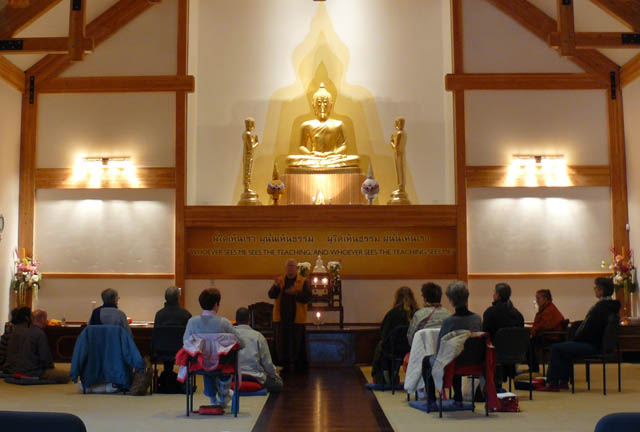
Kobai Scott Whitney addressed the 2014 Day of Mindful Recovery, also at Wat Atammayatarama.
Photos by: Debra Greenfield.
Nearly a dozen people gathered at Wat Atammayatarama Buddhist Monastery in Washington state this July, for the annual “Day of Mindful Recovery” retreat.
The events are organized by Northwest Buddhist Recovery, a Seattle –based organization that utilizes Buddhist practices and views, especially mindfulness, to support people recovering from addiction issues. Northwest Buddhist Recovery is a regional affiliate of the Buddhist Recovery Network, which supports worldwide Buddhist-oriented recovery meetings and the development of educational resources.
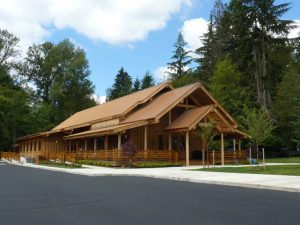
Wat Atammayatarama in Woodinville, supported by the Thai community, provided a venue for the event.
The retreats attract people from Washington and British Columbia, who are attending Buddhist-oriented or mindfulness-based support groups. Northwest Buddhist Recovery organizes the retreats to encourage these people to move forward with their meditation practice.
“As the event organizer for NWBR, I’m grateful for the collaboration that has developed between our organization and the temple,” said Debra Greenfield, event organizer for Northwest Buddhist Recovery, before the July event. “I am hoping some will find a refuge here as I did so many years ago, and experience the kindness and open-handed generosity of the monks and the Thai Buddhist community, at this sacred place.”
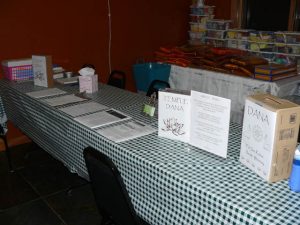
Nearly a dozen people registered for the 2016 version of the event.
Early on July 23 it was a beautiful sunny day at the monastery in the town of Woodinville, north of Seattle, as volunteers from Northwest Buddhist Recovery were getting ready for the daylong retreat. At 5 a.m., event organizers who had stayed overnight at the temple stepped out into the cool morning with their first cup of coffee.
Those who had stayed overnight joined the monks in their morning chanting. There was a light breakfast, and Ven. Santidhammo and Ajahn Ritthi checked in with everyone to make sure they had everything they needed. The welcoming attitude of everyone at the temple shone throughout the day, as the practitioners were provided with their needs so they could spend the day in noble silence and fully engage in their practice.
One of the volunteers arrived with a van towing the cutest little green camper, which was a big hit with Ajahn Ritthi, abbot of the monastery. He and resident monks had welcomed the volunteers the evening before, with evening chanting and meditation.
The day was similar to most daylong retreats. There are a few additions to tailor the day to those in recovery, but anyone is welcome and can benefit from attending.
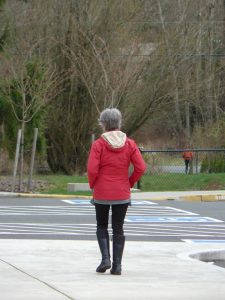
A practitioner learning walking meditation.
The groups gathered for the opening meeting, in which everyone introduced themselves by their first name and talked about what their expectations were for the day. Ven. Santidhammo then took over and led guided sitting and walking meditation periods, offering instruction for each throughout the day.
The day was held in noble silence, and while this was unexpectedly difficult for some at first, they soon fell right into the peace and quiet.
After lunch Ven. Santidhammo offered a dharma talk under the trees, which he called “Working with Craving in our Meditation Practice.” He then led another session of sitting and walking. At 5:30 p.m. we gathered for some gentle yoga instruction, led by meditation and yoga practitioner David, who prefers to use only his first name.
The day ended with another meeting, during which participants shared what they would bring home with them. The overwhelming response to the day was appreciation of the support and sangha, and a renewed commitment to develop a daily meditation practice.
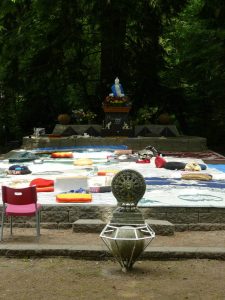
The outside practice area, under trees, set up for a dharma talk.
Almost everyone stayed to help clean up for the temple’s Sunday services the next day, and a few sat with the monks for evening chanting before heading back to their lives.
For some, the annual Day of Mindful Recovery is their first daylong mediation experience. The program is one of the few available tailored for those in recovery from addiction.
Many of those who attend these peer-led meetings are new to meditation, and only understand the basics of anapanasati, the traditional instruction for cultivating mindful attention to the breath.
Because they are peer led, the groups use recorded or written beginning meditation instruction to practice sitting together. The facilitators also encourage them to deepen their practice by seeking meditation instruction from qualified teachers, and by sitting with other groups and by engaging in dharma discussions.
As more people seek relief from the suffering caused by dis-ease in their minds and bodies, more support groups are being started to encourage development of mindfulness practices that can benefit all.
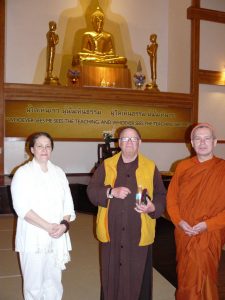
Debra Greenfield, Ven. Kobai and Ven. Santidhammo in 2014.
Ajahn Ritthi and the board of directors have long opened the temple doors for these Day of Mindful Recovery retreats. Since 2010 resident monk Ven. Santidhammo, often called Ven. Santi, has worked with us to develop a schedule specific to the needs of people working with addiction issues.
Ven. Santidhammo has led “Meditation for Recovery” workshops, offered dharma talks and led several of the Day of Mindful Recovery retreats at the temple. Ven. Santi has a strong background in working with recovering addicts in Seattle during his 15 years as a journalist, and as a political activist focusing on human rights issues.
Ven. Santi currently visits prison inmates and works with them as a spiritual and meditation counselor, as well as supporting local Buddhist recovery meetings and events.
As the event organizer for Northwest Buddhist Recovery, I’m grateful for the collaboration that has developed between our organization and the temple. I’m also grateful for the opportunity to once again introduce fellow meditation practitioners to the place where I took my first Buddhist precepts, have celebrated pujas and Sunday services, and have attended summer and fall meditation retreats.
